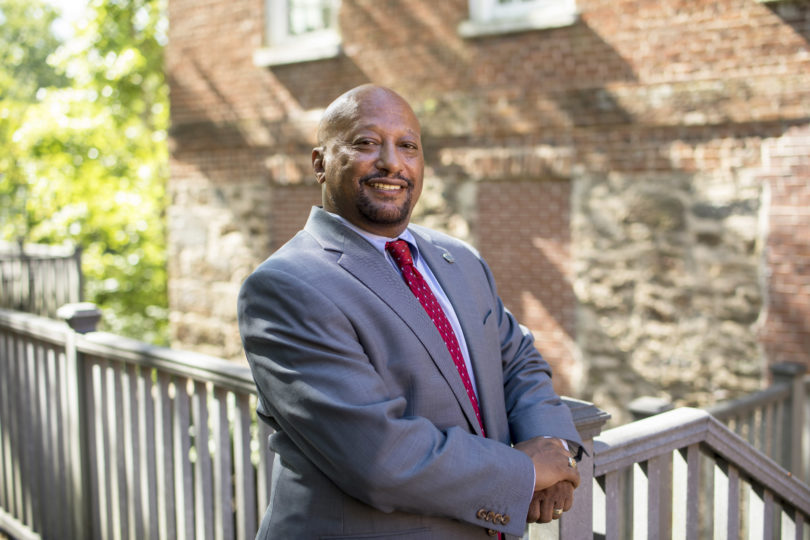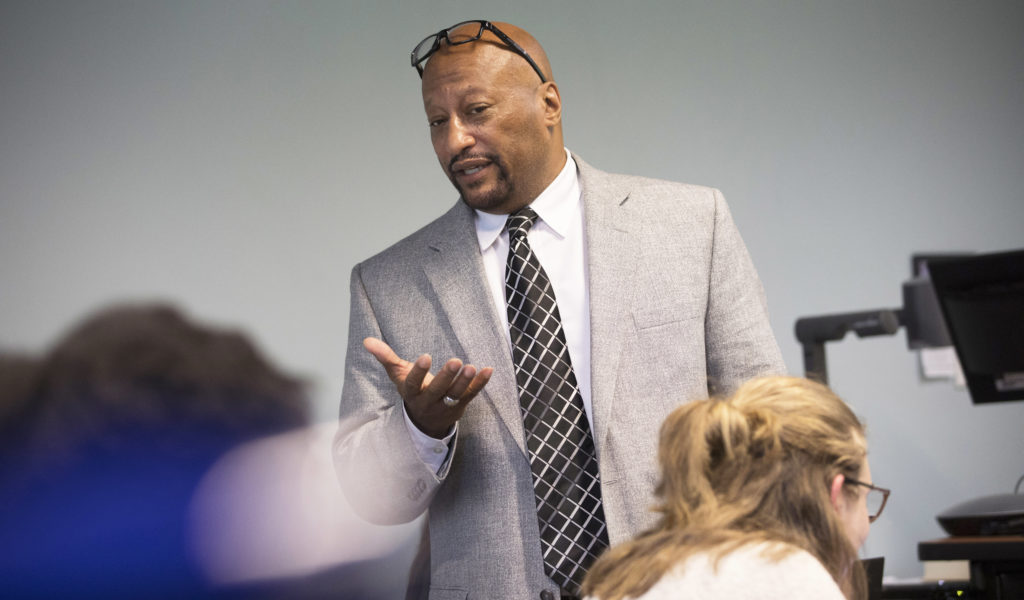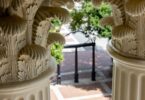Michael Robinson, an associate professor in the School of Social Work, challenges his students to think beyond the textbook and prepares them to be the best research-informed practitioners possible.
Where did you earn degrees and what are your current responsibilities at UGA?
I received a Bachelor of Science degree in finance from DePaul University in Chicago and earned a Master of Science in social work and my Ph.D. from the University of Louisville.
I am an associate professor in the UGA School of Social Work and director of the Study Abroad in Northern Ireland program. I am also the coordinator of the Marriage and Family Certificate Program, which is a joint program of the School of Social Work, College of Education and College of Family and Consumer Sciences. In addition, I am a faculty fellow in the Center for Social Justice and Human Rights, serve on the advisory board for the First-Year Odyssey Seminar program and teach in Freshman College.
When did you come to UGA and what brought you here?
I came to UGA in August of 2015 because this has been my dream job for several years prior.
What are your favorite courses and why?
My favorite course is “Ethics in Marriage and Family Therapy” because it gives me the opportunity to challenge my students to think beyond the textbook. Ethical decision making is not a black and white process, and codes of ethics of the helping professions (i.e. National Association of Social Workers, American Association for Marriage and Family Therapy and others) are gray. If my students do not develop and follow an ethical decision making model, they are prone to making bad decisions that could jeopardize their licensure.
I also enjoy teaching First-Year Odyssey Seminar students. I think this is an awesome responsibility because FYO instructors are oftentimes the first interaction most incoming freshman students have with a university professor. This also gives the student an opportunity to know a professor outside of the formal classroom setting, which also can lead to mentoring opportunities.
What are some highlights of your career at UGA?
My first highlight is being hired by UGA, as this has been my dream job since graduating from my doctoral program. UGA has one of the top social work programs in the country.
My second highlight is being promoted to associate professor with tenure, as this is the dream of any tenure-track professor.
My third and most important highlight is to have some of the best colleagues in the country to work with. The School of Social Work has some of the best minds in the field, and working alongside my colleagues makes coming to work a rewarding experience.
How do you describe the scope and impact of your research or scholarship to people outside of your field?
My research centers on social justice issues encountered by people of color. One injustice in particular is the relationship with U.S. law enforcement. This relationship is tempestuous at best. There is hope, however, and it is my intent to work with scholars across the country to find viable solutions to improve this relationship. The scope of my research with colleagues has included manuscripts that have been downloaded over 8,600 times. The special issue journal that I co-edited with colleagues to date has been the most downloaded/viewed in the journal’s history. This gives me the fuel to continue with this area of research. Moreover, I received an award for a manuscript that was selected as the most impactful article of the year by the accrediting body for social work, the Conference of Social Work Educations’ Council on Racial Ethnic and Cultural Diversity.
How does your research or scholarship inspire your teaching, and vice versa?
My scholarship inspires my teaching because I am training social work students to be the best research-informed practitioners possible. I can give them firsthand knowledge of what many of their clients face, as my lived experience may not be much different. Interacting with my students and listening to how they discuss social issues prevalent in our society makes me a better researcher because I can take their assumptions to the lab and incorporate these ideas into possible research questions and solutions.
What do you hope students gain from their classroom experience with you?
I hope my students will feel that I have challenged them to be the best possible person/student they can be. I also want them to be able to reflect back on their time in my class and apply what they experienced in their day-to-day personal and professional lives. Overall, I want to contribute to them being the best person they can be.
Describe your ideal student.
My ideal student is one who comes to class ready and willing to experience what the curriculum has to offer. I want that student to challenge what is presented in class as they build on their knowledge base. The ideal student is constantly adding critical information they will need to be successful and knowledgeable professionals to their toolbox.
Favorite place to be/thing to do on campus is…
My favorite place on campus is Sanford Stadium. I absolutely love college football and tailgating. The smell of food cooking on the grill along with the anticipation and excitement of the fans before each game is exhilarating. This is where the community and the university come together weekly with one goal in mind, to see the Dawgs victorious. GO DAWGS!
Community/civic involvement includes…
I am involved with an international consortium of scholars dedicated to exploring trauma people of color experience and developing ways in which they might cope. I am also involved with a policy working group that is dedicated to smart decarceration.
Favorite book/movie (and why)?
“Black Panther,” because this film illustrates what a civilization could achieve in the absence of colonization.
The one UGA experience I will always remember will be…
I will always remember the phone call in December of 2018, days before Christmas, from Dean Anna Scheyett informing me that I had earned promotion and tenure.
Is there anything else you’d like to add?
I was truly honored and humbled to win one of the university’s teaching awards. In the spring of 2018, I won a First-Year Odyssey teaching award.
(Originally published Sept. 9, 2018)









